Innovation and Entrepreneurship
The course nurtures business ideas from start to finish with online mentorship, enhancing knowledge & skills in an inclusive entrepreneurial setting.
The course nurtures business ideas from start to finish with online mentorship, enhancing knowledge & skills in an inclusive entrepreneurial setting.
The online course in Innovation and Entrepreneurship is an integral component of the DISCO Training Program, which is designed for students, academic staff, and non-academic employees in higher education institutions. Its principal goal is to promote entrepreneurship by developing digital innovation, creatidvity, sustainable ideas, and global business services across diverse sectors and disciplines. The course emphasises academic entrepreneurship, digital inventions, sustainable innovations, and Global Business Services by leveraging pedagogical content from Norway, Poland, Switzerland, and Ukraine.
The course covers foundational concepts, practical applications, and real-life examples of innovation and entrepreneurship through MOOC-based lectures and activities. Participants develop their ideas from inception to public presentation through online consultation and oversight. By harnessing synergies amongst the participating entities, valuable feedback and mentorship services are provided to improve inclusiveness, diversity, and broader access to support. The course ensures a future-ready learning environment by providing participants with critical information, skills, and mindsets for sustainable innovation and global business services, benefiting both individual growth and the broader ecosystem.
This course was devised as a part of the project Developing Innovative Sustainable Cooperation Opportunities (DISCO), funded by the European Union under the programme EIT HEI Initiative (European Institute of Innovation & Technology Higher Education Institutions Initiative).
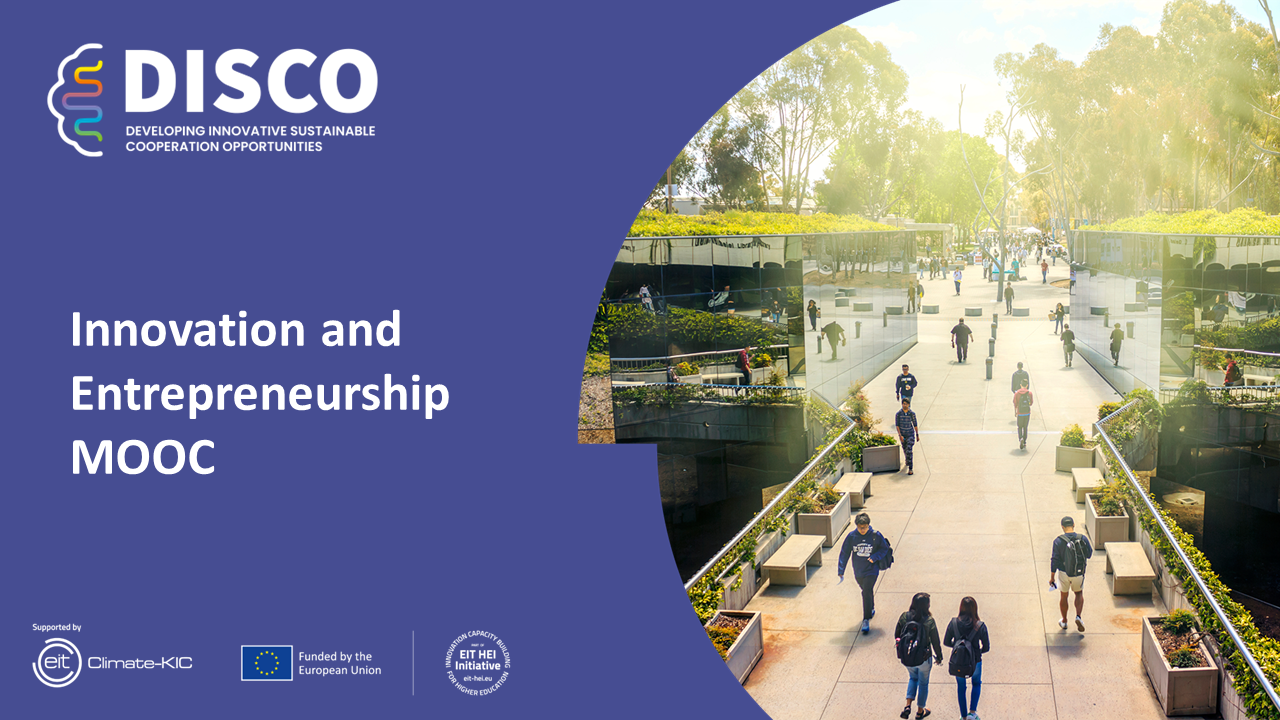
The online course INNOVATION AND ENTREPRENEURSHIP is offered by a project consortium whose members boast diverse experience and, as a result, are capable of providing participants with comprehensive relevant knowledge and practical skills in digital innovation, entrepreneurial management, and starting a business.
Members of the DISCO Project Consortium
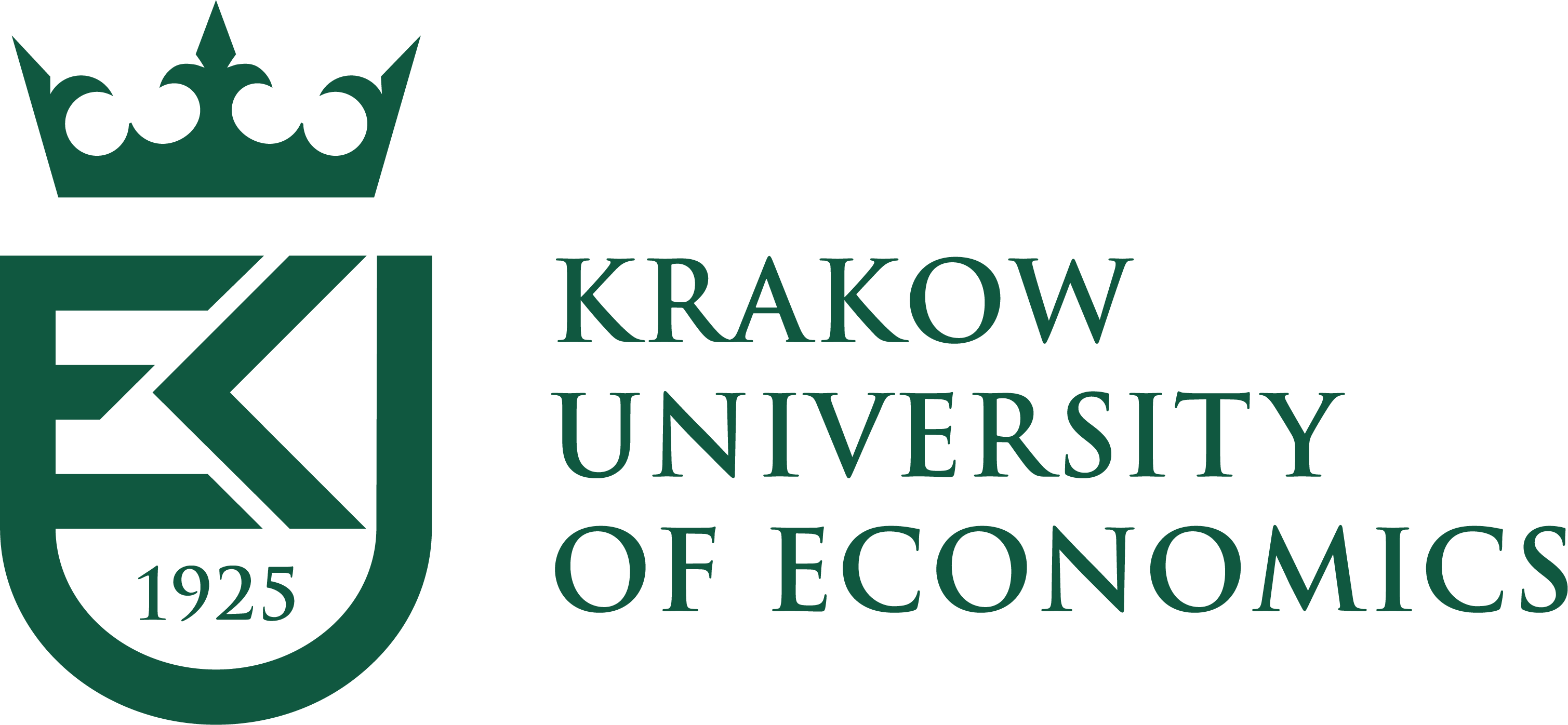

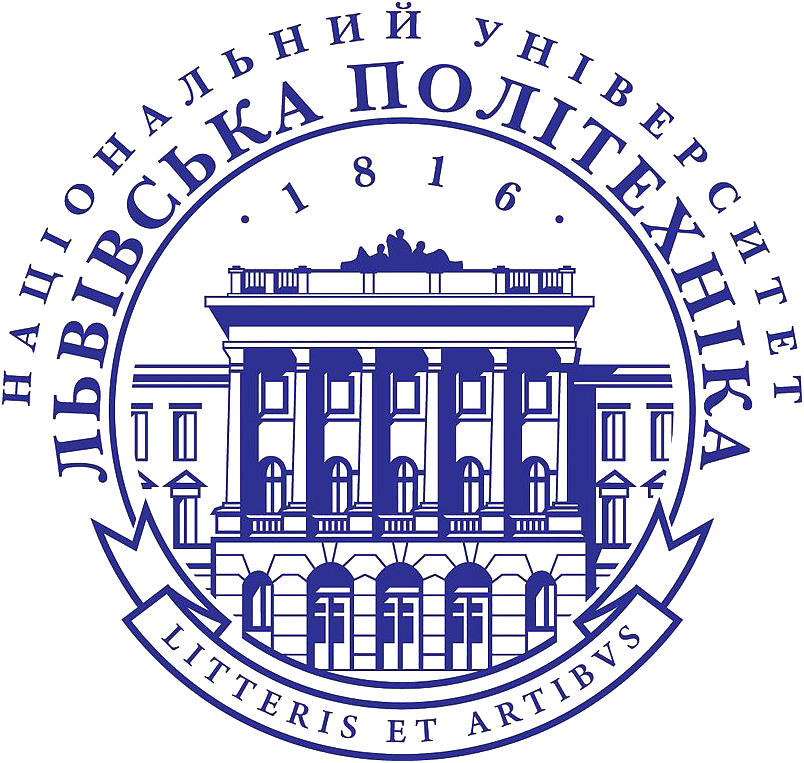
(Lviv National Polytechnic University)

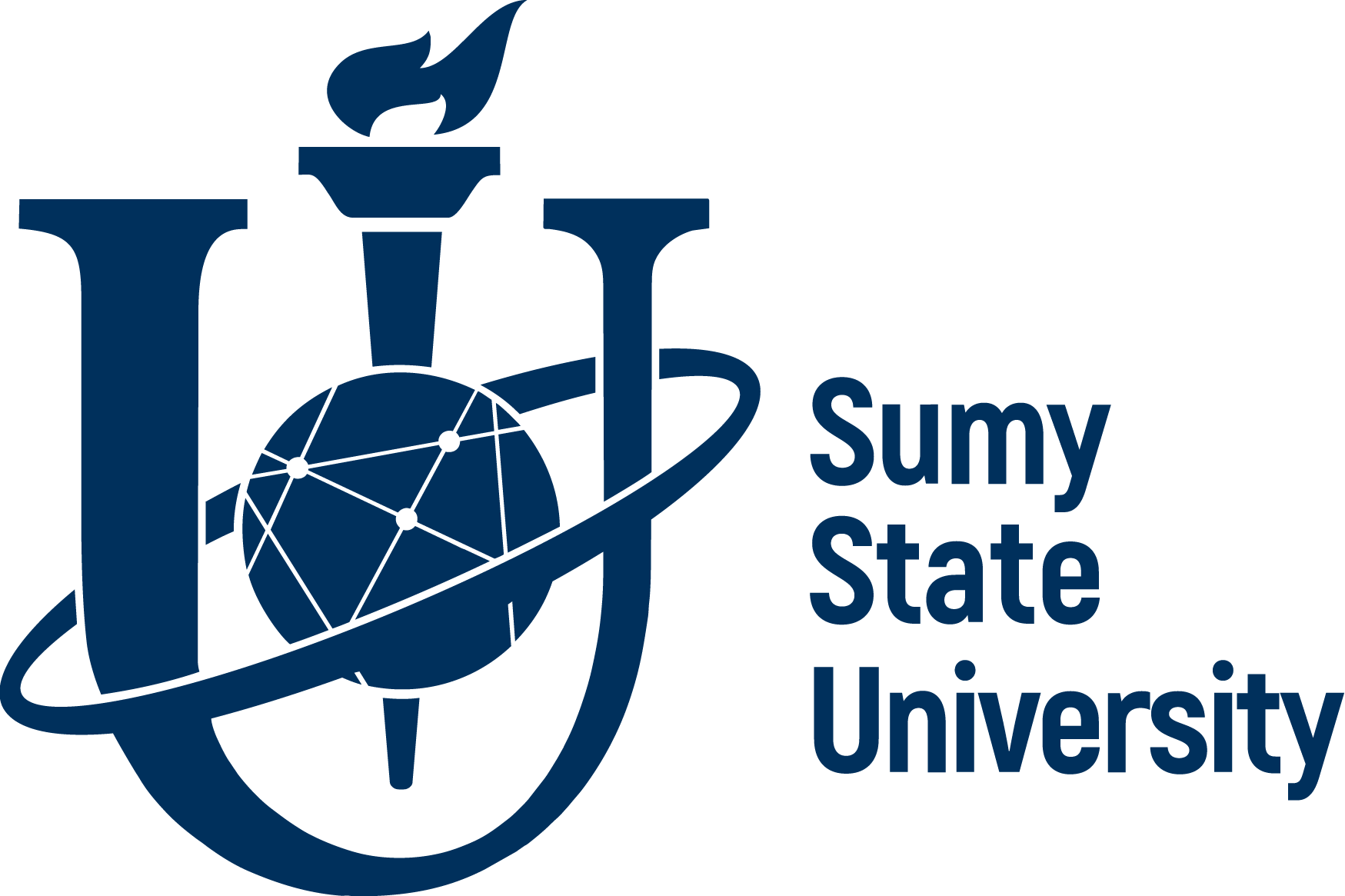

(All-Ukrainian Public Association of Innovative Space Clusters)
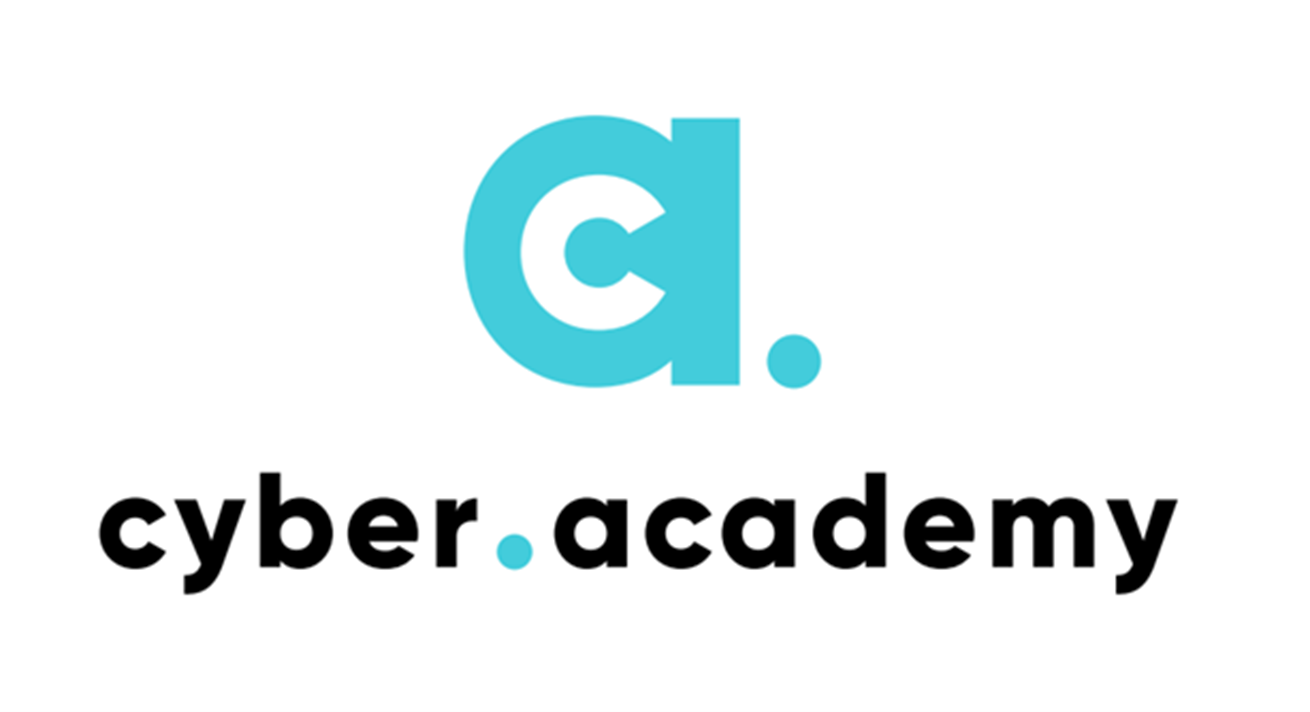
Ternopil Regional Association of Local Governments
In order to fully benefit from the course, it is recommended that participants have the following skills and competencies:
1. Communication skills: basic English communication skills (A2 according to CEFR) are necessary to understand the course materials and participate in discussions.
2. Basic knowledge: basic knowledge of economics, management, and IT will be helpful in comprehending relevant concepts and applying them to innovation and entrepreneurship.
3. Quality enhancement competencies: competencies in taking individual and group actions to improve the quality of education and self-education.
General objectives:
• To encourage digital innovation, creativity, and participation in the field of entrepreneurship.
• To promote sustainable innovation and global business services across diverse sectors and disciplines.
• To enhance entrepreneurship and innovativeness in education and training.
Specific objectives:
• To provide students, academic staff, and non-academic staff with the necessary knowledge and skills to excel in innovation and entrepreneurship.
• To bridge and link pedagogical content and practices from several countries (Norway, Poland, Switzerland, and Ukraine) to ensure a comprehensive learning experience.
• To encourage inclusiveness, diversity, and wider access to innovation and entrepreneurship support by collaborating with non-academic partners.
• To address the specific needs of Ukrainian partners and capitalise on synergies between cooperating entities.
• To create a future-ready learning environment for the development of competencies in innovation and entrepreneurship.
The online course in Innovation and Entrepreneurship aims to foster digital innovation, creativity, sustainable innovations, and global business services by promoting entrepreneurship across various sectors and disciplines in education and training. Its design is based on a Competency Model, which encompasses the necessary knowledge, skills, and mindsets for a future-ready learning landscape in innovation and entrepreneurship development training.
This module will assist participants in developing an organised approach to problem-solving and concept evaluation, as well as understanding Design Thinking principles and tools for building business models. They will also learn about agile development, system thinking, lean progress models, the value of minor innovations for firm competitiveness, and how to overcome challenges while leading successful lean innovation projects utilising the Lean Progress Model.
This module offers participants a range of practical insights into successful sustainable startup ventures. They will learn about the opportunities, barriers, and crucial aspects of establishing a sustainable startup, critically examine the role of corporate management and understand the challenges faced by founders from their organisation’s early stages through its growth phase.
The aim of this module is to help participants understand the role of the circular economy in developing sustainable products and study selected examples of sustainable mobility. They will learn about the fundamentals of the circular economy, product development processes that adhere to its standards and design principles, as well as how to manage the problems inherent in implementing sustainable mobility projects from the vantage point of the founder’s entrepreneurial mindset.
As part of this module, participants will acquire an up-to-date knowledge of the funding sources available for innovation and entrepreneurship projects. They will explore a variety of funding options, including European, international, bilateral, and development funds, and gain a working knowledge of the process of gaining support and assistance for their ideas and projects.
This module seeks to provide comprehensive support for managing Shared Services Centres (SSC/GBS), with a focus on centralisation, process transformation, and automation. The module aims to facilitate the transition from Shared Services to the Global Business Services (GBS) model, equipping participants with the necessary knowledge and skills to effectively implement and optimise these operational frameworks.
This module is intended to assist in identifying and developing marketable and innovative ideas. Participants will be given an opportunity to learn practical methods for idea validation, including testing and addressing market challenges in the digital industries. The module will also explore the critical success factors for startups, provide insights on avoiding pitfalls, and examine the current business and digital industry trends to improve their ability to exploit the emerging opportunities.
This module is intended to give participants a comprehensive grasp of digital transformation and its significance in today’s business landscape. The differences between digitisation, digitalisation, and digital transformation will be discussed, as well as how these concepts are related. Moreover, participants will be introduced to a wide range of technologies used in digital transformation and learn how to adopt a digital mindset and leverage these technologies for innovation. By the end of the module, participants will have a solid grounding in digital innovation and will be equipped to effectively navigate the evolving digital landscape.
This module comprises the necessary information and skills that will enable participants to undertake market analysis for digital startups. They will discover the importance of market analysis in assessing market readiness, learn to identify potential competitors and investors, as well as formulate effective strategies. The module also covers market classification, stages of market analysis, determining the market size, evaluating the key variables, and utilizing appropriate tools and data sources for comprehensive market analysis.
The purpose of this module is to enable participants to apply the concepts and procedures of sociological research design, as well as methods for supporting innovation and entrepreneurship development. They will discuss the value of valid surveys, reliable sampling as well as qualitative and quantitative sociological methodologies for gaining a competitive advantage, social and economic success, and assessing public satisfaction. They will also critically assess the outcomes of sociological approaches and consider research ethics while developing new products or services.
Participants will engage in practical activities, receive guidance from tutors and mentors, showcase their work, and connect with a community of innovators through online and hybrid formats. This course design fosters a mindset of innovation and entrepreneurship, preparing people for success in the dynamic world of innovation.
Participants will be able to engage online in practical activities, such as DISCO Innovation Labs, where they may propose their ideas and contribute to the design and development of new projects.
Participants are expected improve their skills based on a comparison of pre-course and post-course test results in order to successfully complete the course. Those who score at least 51% on the post-test will be awarded a certificate.
In order to obtain the course completion certificate, participants must meet the following requirements. First, they must complete both the pre- and post-course tests, and then pass the final input-based test with a minimum total grade of 51%.
 Dr. Piotr Kopyciński
Dr. Piotr KopycińskiAssistant Professor at the Department of Public Economics, Crakow University of Economics, Director of the Małopolska School of Public Administration
Research interests: public policy (especially innovation and territorial policy), governance modes (public governance, neo-Weberian state), and reforms in Central and Eastern Europe.
 Marek Oramus
Marek OramusProject management specialist at the Malopolska School of Public Administration, Crakow University of Economics
He has participated in a variety of projects in the field of public management/governance, local development, financial cooperation mechanisms between public administration and non-governmental organisations, involvement of local governments in international associations and supporting public administration in anticipating economic challenges, including bankruptcies.
Research interests include: public management/governance, e-government, big data, and smart cities.
 Prof. Dr. Stephanie Kaudela-Baum
Prof. Dr. Stephanie Kaudela-BaumCo-Head of Competence Centre Business Development, Leadership and HR, Lucerne School of Business
Professor of Organisation Studies, Innovation, and Leadership and Co-Head of the Competence Centre Business Development, Leadership and HR at the Lucerne University of Applied Sciences and Arts/Lucerne School of Business. She has co-authored the book Innovation Leadership as has authored numerous academic papers and books.
Research interests: organisational creativity, innovation, and collective leadership.
 Dr. Katharina Windler
Dr. Katharina WindlerCompetence Centre Service & Operations Management, Lucerne School of Business: Senior Research Associate
She obtained her PhD in Management from Cranfield School of Management, UK. At Lucerne School of Business, she focuses on industry- and government-funded research in the area of service business model development and transformation.
 Isabelle Oehri
Isabelle OehriCompetence Centre Management & Law, Lucerne School of Business: Deputy Head of the Competence Centre Management & Law, Head of the Law & Taxes Division, lecturer and project manager
She studied Law & Economics at the University of St. Gallen and then followed a typical legal career by working as an attorney. She is Deputy Head of the Competence Centre Management & Law, works as a lecturer and coaches university startups. She is a volunteer with the NGO project Cuisine sans Frontières.
 Christian Hohmann
Christian HohmannCo-Program Director Smart-up, Co-Head of Program MAS Industrial Management, Co-Head of Program MAS Business Administration and Engineering, lecturer, Lucerne School of Engineering & Architecture
He lectures on product innovation and design thinking as well as delivers continuous education programs at the nexus of engineering and business. He co-authored the well-known Design Thinking Toolbox and co-created the International Study week on Design Thinking in cooperation with Larry Leifer of Stanford University. His professional background includes precision engineering and business administration.
 Prof. Dr. Patrick Link
Prof. Dr. Patrick LinkLecturer, Lucerne School of Engineering & Architecture
Professor of Product Innovation. He studied Mechanical Engineering and obtained his doctorate in innovation management at ETH Zurich. Afterwards he worked for Siemens in a variety of capacities. He co-edited the books The Design Thinking Playbook and The Design Thinking Toolbox. At the LUASA, he launched the startup support initiative Smart-up.
 Dr. David Griesbach
Dr. David GriesbachLecturer, Lucerne School of Business
Lecturer in Lean Innovation, Lean Startup, and Strategic Innovation Management. He is a Swiss expert in Lean Innovation and Lean Startup and has advised countless companies and innovation teams. Since 2013, he has been running one of Europe’s first and most intensive Lean Startup courses at the Lucerne School of Business in Switzerland. He is the author of the Lean Innovation Guide, an acclaimed trainer, consultant, and sought-after keynote speaker.
 Prof. Dr. Christine Grimm
Prof. Dr. Christine GrimmLecturer, Lucerne School of Engineering & Architecture
She received her MSc in Management and PhD in Science Technology and Innovation Studies at the University of Edinburgh. Having worked over 15 years in consulting and technology innovation and having lived in six different countries, she draws on extensive industry and intercultural experience in her research and teaching. She is passionate about Innovation Management and the Circular Economy. She lives in Zürich with her husband and two children.
 Prof. Dr. Stephen Wittkopf
Prof. Dr. Stephen WittkopfHead of Knowledge and Innovation Transfer, Head of International Relations, Lecturer Lucerne School of Engineering & Architecture
He holds a doctorate in architecture and is a professor at the Lucerne University of Applied Sciences and Arts. He heads the Knowledge and Innovation Transfer and International Relations departments, conducts research and teaches in the field of architecturally integrated photovoltaics.
 Izabela Sęk
Izabela SękMSc, Professional Expert
Apart from her educational background (MSc @CUE, post-graduate studies @SGH, CIMA/AICPA Program) Izabela Sęk brings over 19 years of professional experience of operating in a Shared Service/ Global Business Services environment, with a background in Finance & Accounting and corporate project management. Izabela has a strong ability to lead teams in an ever-changing technology landscape.
With a strong interest in technology, change and improving business processes, Izabela was promoted in 2021 to lead Hitachi Vantara’s global automation and digitalization projects, under the role of Robotic Process Automation Business Lead.
A true enthusiasm, love for education and open mind, have always supported Iza to continuously learn and encourage others to do the same. Always considering the bigger picture, Izabela is discovering new ways to problem-solving and collaborating with colleagues across the globe. She enjoys meeting new people, and finds real value in improving daily operations. Recently she participates in the Global Business Services course support (coordination, providing practical lectures) at CUE, Krakow.
 Stanislaw Alwasiak
Stanislaw AlwasiakProject expert at the Cracow University of Economics, Director of the Centre for Research and Development of Social Innovation at the Jesuit University in Cracow
He is Project Management Specialist at the Krakow University of Economics and the Director of the Centre for Research and Development of Social Innovation at the Jesuit University in Krakow. He provides consultancy services on social innovation, monitoring, and evaluation to civic organisations, businesses, and local governments. He managed and consulted on projects funded by the EU, EEA, USAID, and the World Bank as well as bilateral and international projects in Poland, Central and Eastern Europe, Caucasus, and Central Asia. His interests include supporting development cooperation initiatives.
 Dr. Bohdana Huriy
Dr. Bohdana HuriyProject expert at the Crakow University of Economics
She is an experienced trainer in the field of social capital and migrant-oriented applied social innovations, as well as the execution of new technology education projects. She currently works at the Crakow University of Economics as an expert in European and international projects. She has worked as a university teacher and trainer as well as in business (IT industry). She has 13 years of experience as a lecturer at two universities, Lviv Polytechnic National University and Ukrainian Catholic University. She is currently working on a migrant help project at the Jesuit University in Krakow.
Her interests include: migration, social capital, and social innovation.
 Dr. Olena Pozniakova
Dr. Olena PozniakovaAssociate Professor of Department of Financial and Administrative Management, Lviv Polytechnic National University.
She coordinates projects in the Tech StartUp School and is an experienced lecturer in fundamental analyses, market research, financial markets, risk management, the digitalisation of public economy and the financial sector. As a lecturer, she has had 16 years of experience at two universities: Lviv Polytechnic National University and the Crakow University of Economics.
Research interests: ownership transformation (sharing economy, asset migration), development of innovation ecosystems, digital innovation, and economic growth.
 Prof. Dr. Nazar Podolchak
Prof. Dr. Nazar PodolchakHead of the Department of Administrative and Financial Management of the Lviv Polytechnic, Head of the Science Park of the Lviv Polytechnic and Tech StartUp School, Professor, Honorary Ambassador of the City of Lviv
He has participated in more than 40 international and domestic educational and scientific grants. He was awarded internships at leading universities in Europe and the USA, including Harvard University, University of Vienna, Massachusetts Institute of Technology, University of Derby, University of Texas, Boston University, and Duke University. He has delivered a number of training courses and workshops for domestic enterprises and state institutions.
 Prof. Dr. Oleh Sokil
Prof. Dr. Oleh SokilProfessor at the Department of Financial and Administrative Management, Leading Specialist of Lviv Polytechnic National University Tech StartUp School
He has published over 70 papers in various periodicals and journals in Ukraine, Germany, Italy, Turkey, and the Czech Republic. He has 15 years of research and teaching experience at a state university ranging from laboratory assistant to professor and head of the department at the Faculty of Economics and Business. Apart from his 10 years of experience in agribusiness, since 2011, he has been a private entrepreneur in the sector of hospitality and tourism since 2011 (experience in the adoption of digital technologies for the automation of points of sale and service supply).